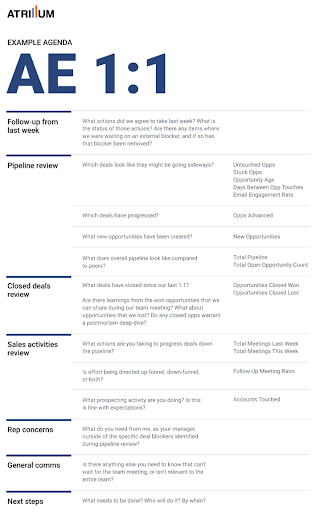Being a data-driven sales manager means, at a high level, understanding how metrics impact one another, how to approach setting goals against key performance indicators (KPIs) and how to coach to the achievement of those goals. Where the rubber really meets the road, though, is how a manager incorporates data into her ongoing managerial cadences. The most impactful place to do this is in weekly one-on-one meetings.
What Data Do You Need?
Incorporating data into your one-on-one meetings with your reps starts with determining what information you need in order to have a productive conversation.
How to Develop Data-Driven One-on-Ones
- Document the key topics you want to cover on your agenda.
- Define what questions you are trying to answer within each topic.
- Identify the pieces of data most important to be able to answer those questions.
Here’s an example of what this might look like (and here is a downloadable data driven one-on-one template):

Make the Data Accessible
The data points identified in the third step, which appear in the far right column in the example above, are the ones that need to be accessible on an ongoing basis and reviewed in preparation for each one-on-one meeting. The most common method of making data like this available is by building a dashboard in Salesforce (or in the sales analytics and reporting software used in your organization like we make at Atrium).
You can then share that dashboard with reps and link to it in recurring meeting invites for the one-on-one itself. This will also save you time because you can use the same link for the preparation time you schedule on your own calendar in advance of the meeting, so it’s always available and easy to find. Similarly, if you keep a Google Doc or other one-on-one template somewhere that’s completed for each meeting, you can link the dashboard at the top of that document as well.
Preparing for the Meeting
Once you have a clear agenda, and a dashboard set up so you have the data to inform your agenda, making the meeting as productive as possible just comes down to preparation each and every week.
First, you should assign ownership to specific agenda items. As the manager, you are ultimately responsible for making sure this meeting is productive, but many organizations have the sales reps own key areas of preparation for the meeting. In some instances, this includes asking sales reps to bring data about their own performance to the meeting and having a portion of the agenda solely dedicated to the rep’s concerns or topic areas they want to discuss.
Make sure it’s clear who’s responsible for what pieces of preparation in advance of the meeting and who’ll be driving each piece of the agenda.
With that structure in place, the remaining hurdle is time. The best way I’ve found to ensure I have time to prep for one-on-ones is to make that prep time its own block on my calendar, so that time can’t be eaten up by other priorities. Often you can prep for multiple one-on-ones in a single time block at the beginning of the day. Its seems like a simple, intuitive step but it's easy to let this important prep time get away from you.
Spend your prep time going through a metrics inspection using your saved reports and dashboards, or even the items the rep has brought to the agenda. This way you’ll be sure to walk into the meeting already having a clear sense of what areas you need to discuss and what specific coaching points you need to cover.
Repeat the Cycle
Points covered in the one-on-one meeting will often have associated follow-up and next steps. Be specific about what those are, including the time to completion, who owns that next step and when you’ll check in again. In future meetings, you can check in on those metrics you identified, watch for new indicators of success that can offer learning opportunities across the team and monitor for the next area of coaching and development. With that clarity, you can add the follow-up to the agenda for future meetings and ensure that the reinforcement cycle of data-driven coaching and proactive follow-up continues.





